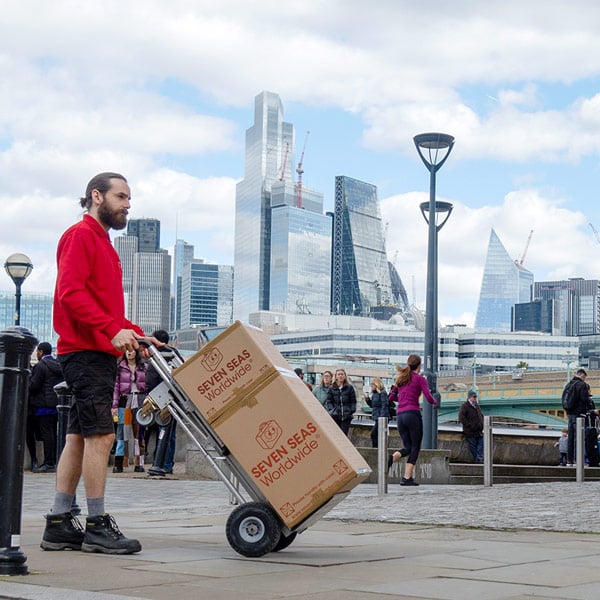Before packing, check this list of items prohibited from entering a particular country or region.
Unfortunately, due to the ongoing conflict in the Middle East, there may be some shipping delays. We’ll continue to keep customers updated and work hard to ensure our services run as smoothly as possible.

What to know before moving to the UK
Moving to the UK is a dream come true for expats looking to soak up ancient history, stunning landscapes, and lively cultural options. From the rugged peaks of the Scottish Highlands to the bustling streets of London and Manchester, the United Kingdom offers endless opportunities!
Britain has experienced a surge in immigration numbers since the COVID-19 pandemic. Between July 2024 and June 2025, 898,000 people entered the UK, hoping to stay for at least a year. Factors include a rise in overseas students and care workers.
Is the UK a good place to live?
The UK is a good place to live thanks to having one of the world's most desirable living standards. Citizens enjoy free healthcare, a multicultural society and picturesque, varied landscapes. Plus, a strong economy, world-renowned universities, forward-thinking climate action, and a cutting-edge music, theatre and arts scene — wow!
Helpful information about living in the United Kingdom

Quick facts about the UK
| Countries | 4 |
| Overseas territories | 14 |
| Capitals | London (UK) — London (England), Edinburgh (Scotland), Cardiff (Wales) and Belfast (Northern Ireland) |
| Population | 67.59M |
| Official language | English (de facto) |
| Area | 94,354 mi² (244,376 km²) (78th largest in the world) |
| Currency | Pound sterling (GBP) (£) |
| Form of government | Unitary parliamentary constitutional monarchy |
| GDP (total) | $4.4 trillion (10th in the world) |
| GDP (per capita) | $63,759 (33rd in the world) |
| Human Development Index (HDI) | 0.94 (13th in the world) |
| Time zone | GMT +0 |
(Sources: ons.gov.uk, imf.org, hdr.undp.org)
From the rugged peaks of the Scottish Highlands to the bustling streets of London and Manchester, the United Kingdom offers endless opportunities!
Map of the British Isles
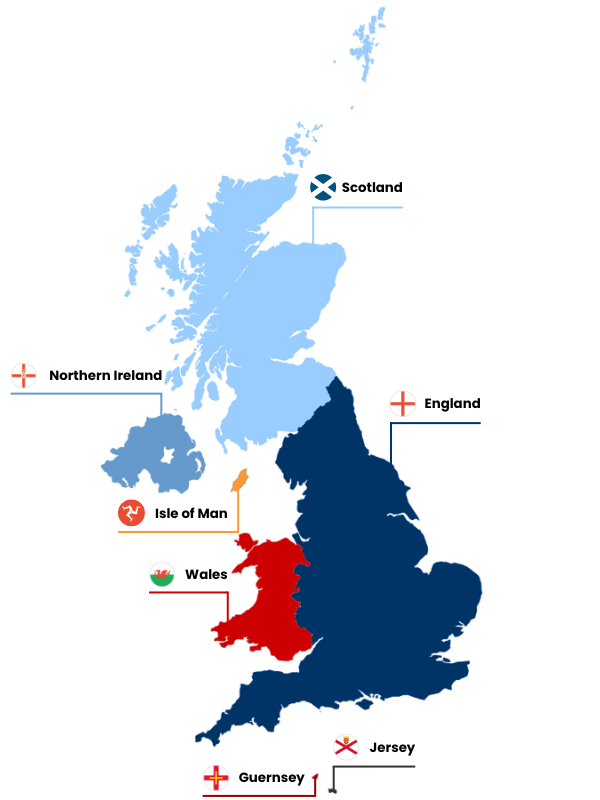

What are the pros and cons of emigrating to the UK?
The UK is an alluring destination packed with tradition, culture, and endless opportunities for those seeking a better quality of life. But nowhere is 100% perfect! So, here are some positives and negatives to consider before deciding on your big move.

Free healthcare:
Founded in 1945, the United Kingdom's National Health Service (NHS) provides free healthcare to all residents through taxation. Essential services, including doctor visits, hospital stays and surgeries, are accessible regardless of income.
History on your doorstep:
The UK attracted an estimated 43.4 million visitors in 2025 thanks to its numerous ancient monuments and buildings. From iconic landmarks like Big Ben and Buckingham Palace to Edinburgh Castle and Stonehenge, there's no shortage of fascinating history to explore.
Educational opportunities:
Britain has some of the world's oldest, most beautiful, and best-performing universities and colleges. Institutions like Oxford, Cambridge, and Imperial College London attract students worldwide seeking a quality education in scenic surroundings.
Access to nature:
Despite its many urbanised cities, the UK has plenty of access to nature and green spaces. From the rugged mountains of the Lake District to countless blooming botanical gardens, there are ample opportunities for outdoor recreation and relaxation around the country.

High cost of living:
Living in the UK, especially in expensive cities like London, Edinburgh and Oxford, can be costly. Housing, transport, and everyday expenses like food and energy prices can stretch your budget thin. Arguably, the high standard of living offsets costs.
Unpredictable weather:
If you're arriving from a warmer climate, the temperamental British weather might be challenging to adjust to! Winter, especially further north, can feel cold and long. However, the four-seasons-in-one-day vibe adds a unique charm to Britain's lush, green landscapes.
Costly education:
Tuition fees for international students in 2026 are typically higher than those of UK residents. Non-UK residents can expect annual fees of between £11,000 and £38,000, with medical degrees costing upwards of £70,000.
Relations with the EU post-Brexit:
Since the UK departed from the European Union (EU) in January 2020, rules and regulations around trade and travel have changed significantly. As the UK is no longer part of the EU single market and customs union, starting your own business can be challenging due to increased customs checks and tariffs.
What countries are in the UK?
The countries in the UK are: England, Scotland, Wales, and Northern Ireland. Today's United Kingdom emerged gradually over several centuries via England's Norman Conquest, Wales's integration by 1542, the union with Scotland in 1707 and Northern Ireland's inclusion in 1921.

UK visas and immigration: everything you need to know
The United Kingdom is an ever-popular destination for expats looking to start afresh in a country with a high standard of living and plenty of opportunities. However, UK visas are highly sought after, and the application process can be complex. Your best chance of moving to the UK permanently is to have a desirable professional skill or be sponsored by a family member.
There are many types of UK visas, ranging from short stays to those lasting years.
How to move to the UK
To move to the UK, you must determine your eligibility and apply for the correct visa. Once approved, you'll need to pay the applicable fees, provide the requested identification and biometric data, and arrange a removals service. See below for more details.
Determine your eligibility and apply: research which immigration method you qualify for via the UK government's website, providing details such as your nationality, reason for moving and intended length of stay. Popular entry methods include the Skilled Worker visa, Health and Care Worker visa, Graduate visa and Family visa.
Pay your fees and gather your documents: pay your visa's specific charge and, if applicable, the immigration healthcare surcharge (IHS). Keep all your documents in one place, such as your passport, birth certificate, or marriage certificate, to take to a visa application centre or upload them via the UK Immigration: ID Check smartphone app.
Other documents you might need when filling in your application include:
- Educational certificates, e.g. degrees, diplomas or transcripts.
- Proof of work experience, e.g. a letter of employment or CV.
- Proof of language proficiency.
- Proof you can support yourself financially, e.g. bank statements.
Book an appointment: visit your local UK visa application centre to submit biometric data, such as fingerprints and a photograph.
Prepare for arrival: get ready for the exciting move by organising rental accommodation, registering at your local doctor's practice and opening a bank account.

UK visas: complete list
There are many types of UK visas, ranging from short stays to those lasting years. Eligibility depends on many factors, including nationality, country of residence, number of family members in the UK, refugee status, work intentions, study intentions, and more.
You can check which visas you're eligible for on the UK government website.
UK visa types include:
- Visitor visas: for short visits up to six months.
- Skilled Worker visas: for qualified individuals offered employment in an eligible occupation.
- Student visas: temporary and long-term stays for a defined length of time on a course of study in the UK.
- Family visas: to live with family members in the UK.
- Spouse/Fiancé/Partner visas: to join a partner in the UK who is a British citizen.
- Child visas: to join parents or legal guardians in the UK.
- Innovator Founder visas: for those looking to start or run an endorsed, original business in the UK.
- Ancestry visa: for individuals with a grandparent born in the UK, Channel Islands, or the Isle of Man.
- Asylum visa: to seek protection in the UK due to persecution or increased danger in your home country.
How to track UK visa application
To track a UK visa application, you can log into your UK Visas and Immigration (UKVI) online account. From there, you can update your details, view and prove your immigration status and check your application's progress. If you didn't apply online, call or email UKVI, but ensure you have your reference number to hand before getting in touch.

How long does it take to get a UK visa?
To get a UK visa takes between three and twenty-four weeks to process. However, as each application depends on personal circumstances like your current country of residency, visa subtype, staffing levels and demand, times vary. Processing time starts when you submit your supporting documents online or visit a visa application centre to prove your biometric data and ends with an email or letter notification.
Here are the processing times based on the current volume for common UK visa types:
| Visa | Time |
| Standard Visitor | 3 weeks |
| Marriage Visitor | 3 weeks |
| Student | 3 weeks |
| Child Student (4-17 years) | 3 weeks |
| Partner or Spouse | 24 weeks |
| Parent | 24 weeks |
| Child | 24 weeks |
| Skilled Worker | 3 weeks |
| Health and Care Worker | 3 weeks |
| Innovator Founder | 3 weeks |
Check the UK Government Services website to see if you need to apply for a visa before visiting the country.
UK visa application
All visitors need a valid passport before entering the United Kingdom. If arriving from certain countries, such as Schengen Area members, the US, Canada, Japan and Australia, you can reside in the UK for up to six months without a visa. However, you cannot undertake any work, including self-employment.
Check the UK Government Services website to see if you need to apply for a visa before visiting the country.
Common visas include:
Skilled Worker visa:
A Skilled Worker visa allows overseas residents to work for an approved employer in the UK for up to five years. After this, you can reapply multiple times if you still meet the eligibility requirements. After five years of continuous stay, you can apply for permanent residency, known as indefinite leave to remain.
You must apply online. Fees vary based on you and your family's circumstances. Skilled Worker visa holders can work, study, bring eligible dependents, volunteer and take on a second job.
Health and Care Worker visa:
A Health and Care Worker visa lets doctors, nurses, and other medical professionals from overseas work in the UK for the NHS, an NHS supplier, or adult social care. Health and Care Worker visas last up to five years, after which you can apply for an extension or indefinite leave to remain.
Student visa:
A Student visa allows successful applicants over 16 years old to study in the UK on a course sponsored by a licenced student sponsor. Depending on the course, you can stay in the country for up to five years. Once you complete the course, you can apply to continue your studies or switch to a Graduate visa, which gives you two years of additional stay.
Family visa:
A UK Family visa allows immigrants to reside with a spouse, partner, children, parents or relatives who require long-term care. Fees vary based on each individual's circumstances and whether you're applying from inside or outside the UK. You can reapply as often as you wish. Depending on your visa type, you may be eligible for indefinite leave to remain after two to five years.
UK visa requirements
Eligibility for UK visas depends on several factors, including the purpose of your stay, the country you arrive from and personal circumstances. Common types of visas include visitor visas, work visas, student visas, and family visas. Each visa category has specific eligibility requirements. It's essential you thoroughly research your visa type before submitting your application.
Skilled Worker visa requirements include:
- Sponsorship from a UK employer with a Certificate of Sponsorship (CoS) as proof.
- Having a job offer on the eligible occupations list.
- Meeting the minimum salary criteria, depending on your job.
- Proving your ability to read, speak, write and understand English.
Health and Care Worker visa eligibility includes:
- Sponsorship from a UK employer with a Certificate of Sponsorship (CoS) as proof.
- Being a fully qualified doctor, nurse, or social care professional.
- Meeting the minimum salary criteria, depending on your job.
- English language proficiency.
To apply for a Student visa, you must:
- Be 16 years or older. If you are under 18, you must provide evidence of your parents' consent.
- Have an offer from a licensed student sponsor.
- Pay application fees of £524.
- Have enough funds to support yourself and pay for your studies.
- Be able to speak, read, write and comprehend English.


How much does a UK visa cost 2026?
The cost of a UK visa in 2026 depends on several factors, including whether you are inside or outside the UK when applying, the length and purpose of your stay, premium services and more. Below are some of the most common application costs for UK visas*. However, check the UKVI website before applying, as prices are subject to change.
Please note that prices do not include additional fees based on personal circumstances, such as biometric enrolment and the healthcare surcharge.
![]()
Visitor visas
- Visitor in Transit visa: £64
- Up to 6 months: £127
- Up to 2 years: £475
- Up to 5 years: £848
- Up to 10 years: £1,059
![]()
Work visas
- Innovator Founder: £1,274
- Skilled Worker: £769 for 3 years or less/£1,519 over 3 years
- Skilled Worker in shortage occupation: £590 for 3 years or less/£1,160 over 3 years
- Skilled Worker – Health and Care Visa: £304 for 3 years or less/£590 over 3 years
![]()
Student visas
- Adult Student: £524
- Child Student (for children aged 4 and 17 years old): £524
- Short-term Student (over 6 months, less than 11 months): £214
Source: gov.uk
*prices accurate as of 2026
Can I retire in the UK?
You cannot retire in the UK if you're an expat as the country no longer has a retirement visa. However, you can apply for a working or family visa and then for indefinite leave to remain after a certain period, usually five years. You'll need at least ten years of qualifying work contributions to receive the UK state pension.
The United Kingdom's Skilled Worker visa allows immigrants to apply for employer sponsorship for a pre-approved role.

Youth Mobility Scheme: how to apply for a young person's visa
The Youth Mobility Scheme visa allows young adults aged 18 to 30 (35 in some cases) from specific countries to live and work in the UK for up to two years. If selected via ballot, eligible countries include Australia, Canada, Japan, Iceland, South Korea, Hong Kong and Taiwan.
You can leave and re-enter the UK as many times as you like. Applicants must prove they have at least £2,530 for 28 consecutive days after applying to support themselves in the UK. You cannot apply if you have children under 18 who live with you or depend on you financially or if you have previously lived in the UK under the Youth Mobility Scheme.
Check which documents you must provide based on your country of origin, including a tuberculosis test result in some regions, and then apply online.
There is a separate scheme for Indian nationals, the India Young Professionals Scheme visa.
Is there a UK visa lottery?
The UK does not have a visa lottery similar to the United States's Diversity Immigrant Visa Program, which allows applicants from certain countries to win a visa by random selection.
Instead, your best chance of securing a move to the UK is having desirable work experience. The United Kingdom's Skilled Worker visa allows immigrants to apply for employer sponsorship for a pre-approved role. Qualifying criteria include being 18 years or older, meeting the minimum salary threshold of £41,700*, and proving your English language ability.
*price accurate as of 2026
What percentage of the UK's population is immigrants?
Immigrants are
16% of the UK's population in 2026

UK citizenship: everything you need to know
Once you and your family have sampled life in the UK and want to stay, your next step is to apply for citizenship, sometimes known as "naturalisation".
For many, obtaining British citizenship is more than just a formality — it's about fully integrating with your new surroundings and connecting with your fellow Brits. Plus, you'll be able to vote, live, work, study, take up political office, apply for a passport, bring relatives or spouses, and leave the UK as often as you like.
For many, obtaining British citizenship is more than just a formality — it's about fully integrating with your new surroundings and connecting with your fellow Brits.
How to get British citizenship
The most common ways to get British citizenship are by birthright, marriage and civil partnerships, or applying for Indefinite Leave to Remain (ILR).
Below, we explore these various routes in more depth:
Birthright
Being born in the UK does not automatically grant you British citizenship. Factors include your parents' nationalities and when you were born. You can check the UK government website to see if you're a British Citizen and then apply for citizenship.
Marriage and civil partnerships
You can apply for citizenship when you marry or enter into a civil partnership with a British citizen if:
- You can prove you've lived in the UK for three years.
- You pass the life in the UK test.
- You can prove your knowledge of the English language.
- You've been granted Indefinite Leave to Remain (ILR) or settled status.
- You're 18 years or older.
Indefinite Leave to Remain (ILR)
You can apply for ILR after living in the UK for several years, usually five. Exceptions are Tier 1 visas (two or three years) and Innovator Founder and Global Talent visas (three years).
You can apply for citizenship once you've had ILR status for at least twelve months.
Other UK citizenship routes
- Having a British parent.
- Having settled status under the EU settlement scheme (the deadline was June 2021. However, you can still apply if you have "reasonable grounds" for missing the deadline).
- Having another type of British nationality, such as an overseas citizen or a British-protected person.
- Having a mother or father with British overseas territories citizenship.
UK citizenship requirements
The requirements to become a UK citizen depend on several factors, including individual circumstances and which method you're eligible for.
However, general requirements include:
- Residency: apart from a few exceptions, such as having a Tier 1 visa or marrying a British citizen, you must have lived in the UK for at least five years before applying for citizenship.
- Demonstrate good character: complete your application by answering all questions honestly and having no serious crimes or immigration offences in the past ten years.
- English language ability: unless exempt, you must have an English qualification at B1, B2, C1 or C2 level or complete a degree taught in the UK.
- Understand what it means to be British: to become a UK citizen, you must pass the Life in the UK Test — a multiple-choice questionnaire on Britain's history, politics, traditions, and more.
- Fee payments: application costs range from £130 to £1,605, depending on which method of citizenship you qualify for.
*price as of 2026

Life in the UK test: 5 practice questions
The Life in the UK Test is an online quiz consisting of twenty-four multiple-choice questions on the UK's laws, values, history and everyday life. You can prepare for it by studying the Life in the UK handbook.
You must achieve 75% or higher within the 45-minute time limit. Before starting, you'll need an email address, a credit or debit card to pay the £50* cost, and an accepted form of ID.
See how much you know about life in Great Britain and Northern Ireland with these practice questions:
1. Which of these is a famous classical music event in the UK?
a) T in the Park
b) Glastonbury Festival
c) Creamfields
d) The Proms
Answer: d
2. Which UK charity works to preserve important buildings?
a) The Red Cross
b) NSPCC
c) Age UK
d) The National Trust
Answer: d
3. Which flower is associated with England?
a) Thistle
b) Daffodil
c) Rose
d) Shamrock
Answer: c
4. Who was the first Briton to win the Olympic gold medal in the 10,000 metres?
a) Mo Farah
b) Chris Hoy
c) Bradley Wiggins
d) David Weir
Answer: a
5. Which TWO are British Overseas Territories (BOTs)?
a) The Falkland Islands
b) Hawaii
c) Ireland
d) St Helena
Answer: a and d
*price as of 2026
How hard is it to move to the UK?
Moving to the UK is not straightforward and depends on several factors, such as your birthplace, work experience, whether or not you have family in the UK and if you plan to work or study.
Another consideration is the best way to move your personal belongings overseas. The easiest method is to hire a professional international removals company that can provide a self-loading moving pod like the Seven Seas Worldwide MoveCube®.
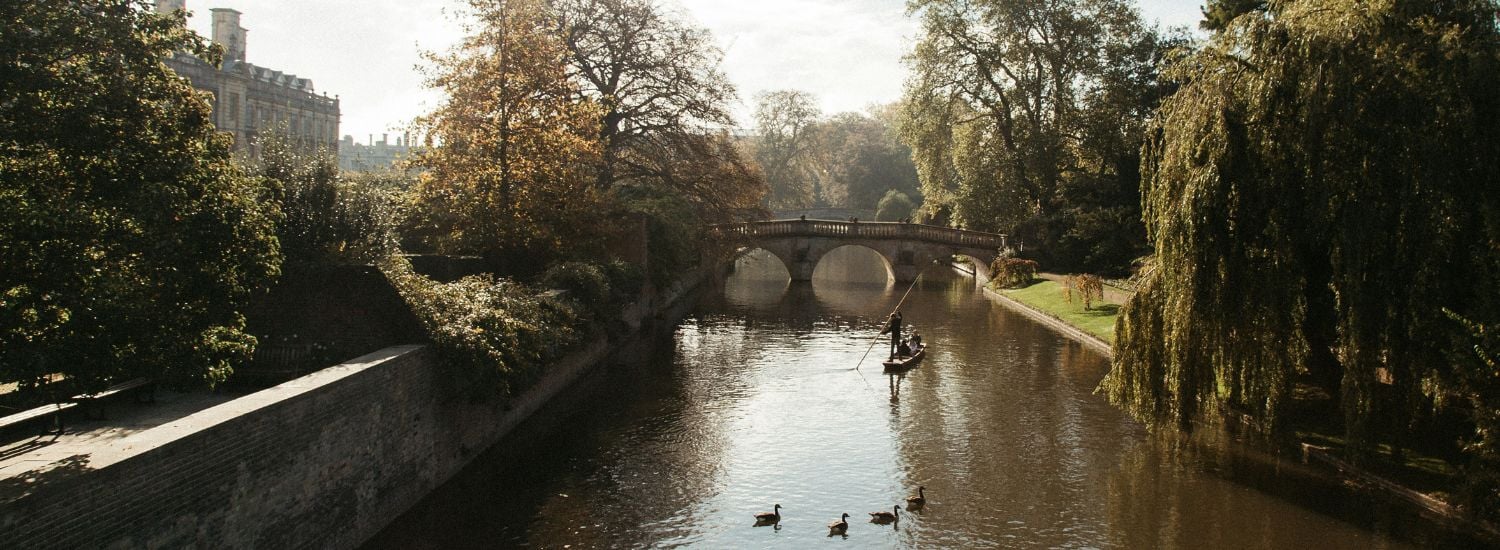
A helpful guide on the UK's cost of living
The cost of living in the UK varies significantly by region and city, so before you move, ensure you budget for accommodation, utilities, educational fees, transport and food. Housing costs, like rent or mortgage payments, are usually the highest expense, especially in popular cities like London, Cambridge, Bristol and Edinburgh.
However, the standard of living in the UK is high: the NHS covers most essential medical care, crime in England and Wales has largely decreased over the last 10 years, the economy is strong (with the 10th highest GDP in the world!), and unemployment is just 5.5%.
How much does moving to the UK cost?
The money needed to move to the UK depends on you and your family's circumstances. However, typical considerations include budgeting for visa application and appointment fees, flights, accommodation and overseas removal costs.
Here is some more information about potential costs to keep in mind:
Visa application costs:
Depending on which UK visa you qualify for, you'll need to consider application fees and the yearly healthcare surcharge — the exact amount depends on the length and type of your visa. Plus, there are costs to consider when visiting a visa application centre to confirm your identification and take your biometrics.
Flights:
The cost of flights to the UK depends on your country of origin, the time of year, and the airline. Save money by booking in advance using flight comparison websites like Flights Finder, Skyscanner, and Google Flights. Consider paying for an open return ticket so you can easily return home if settling in proves difficult.
Temporary accommodation:
Buying a property on arrival in the UK is a big commitment. Instead, consider renting first to acclimatise to your new surroundings comfortably. Popular property rental websites in the UK include Rightmove, Zoopla, and OnTheMarket.
Rents vary by city and the size and type of home. According to small business payment provider takepayments, the UK's cheapest city is Middlesborough with an affordability score of 6.51/10. In contrast, London is the most expensive, scoring just of 3.12/10.
... the UK's cheapest city is Middlesborough with an affordability score of 6.51/10. In contrast, London is the most expensive, scoring just of 3.12/10.

How much money do you need in the bank to move to the UK?
The money you need in the bank to move to the UK depends on your immigration method. Expenses include flights, accommodation, visa fees, biometric fees, the healthcare surcharge, and enough money to support yourself until you secure a job.
...according to iSchool Connect, the average monthly cost of travel in the UK is £140.
Is it expensive to live in the UK?
While the cost of living varies depending on location, lifestyle, and family size, expenses in the UK are more substantial than in some other developed nations. However, the minimum wage is relatively high (£11.44 for those 21 and over), unemployment is just 5.5%, and many regions outside big cities like London and Oxford are considerably cheaper.
Before deciding, research the cities and towns you're interested in and create a budget based on your income and likely expenses. The official UK government website has a breakdown of available cost-of-living support, such as childcare, benefits and pensions.
- Council tax: this tax funds services provided by local authorities, such as schools, recycling and rubbish collection, libraries and the police. Rates vary by region, so research before moving. You may be eligible for a tax reduction or exemption if you are a student, a single occupant or receive benefits.
- Utilities and bills: use comparison websites like Compare the Market and Uswitch to research how much your energy bills, such as electricity, gas and water, will cost.
- Transportation: according to iSchool Connect, the average monthly cost of travel in the UK is £140. However, prices vary significantly by city. In general, using public transport is cheaper, more stress-free, environmentally friendly, and quicker than driving, so consider leaving your car at home.
- Meals and groceries: the worldwide cost of living database, Numbeo, estimates that a three-course meal for two in the UK costs £65.00, a McDonald's McMeal £8, and a 1 litre bottle of Coca-Cola £1.88. For grocery shopping, a litre of milk and a loaf of white bread cost £3.12 in London, £2.875 in Cardiff, and £2.59 in Edinburgh.
- Healthcare: the NHS is the UK's publicly funded healthcare system, offering a wide range of essential medical services to all. It's funded through taxation and provides care free at the point of use. However, certain services, such as eye care, prescriptions (England only) and dental, require payment.

Cost of living in the UK*
Below are average prices (GBP£) for some everyday items and entertainment options in the United Kingdom:
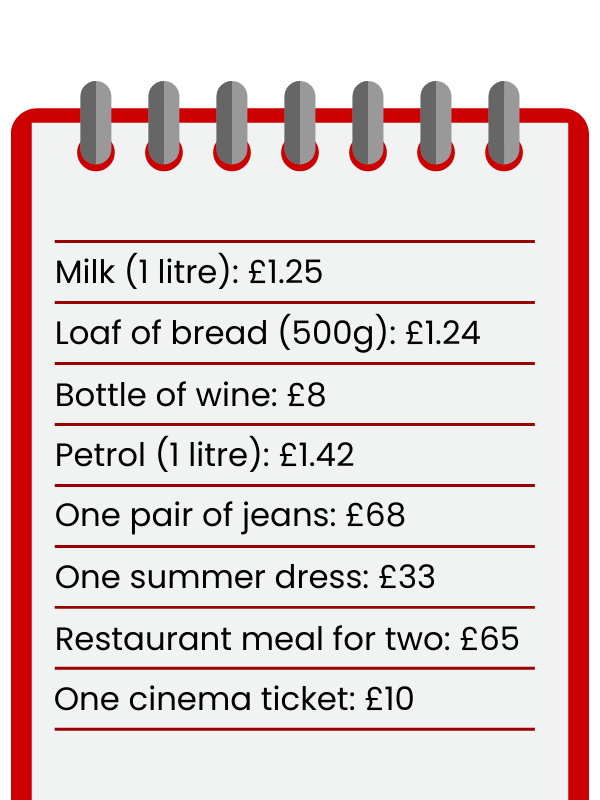

Renting vs. buying a home in the UK
Once you've picked a UK town or city to move to, the next step is deciding whether to buy or rent. Renting offers an excellent opportunity to adapt to your new surroundings before committing to buying a home. Plus, it allows the flexibility to return home if you discover that the UK isn't for you. Alternatively, buying lets you make an investment and build roots immediately.
Remember to book temporary accommodation at a local bed and breakfast (B&B), hotel or Airbnb on arrival, so you have somewhere to live while viewing homes!
![]()
What documents do you need to rent a home in the UK?
Typical documents your potential landlord or letting agent may request include:
- Identification: you'll need to prove your ability to live and work in the UK with copies of your passport, residence permit/visa (showing your biometrics) or university acceptance letter.
- Employment verification: a confirmation letter from your employer clearly stating your job title, start date, duration and salary.
- Proof of income: typically your three most recent months of bank statements or a P60.
- Landlord reference: a letter from your current or former landlord/letting agency detailing the condition in which you left the property and whether you paid on time and respected the lease rules.
- Character/personal reference: as an immigrant, you may also need a reference from a professional such as a lecturer or lawyer. They must have known you for at least two years and not be a relative.
- Credit report: with your permission, your landlord may perform a credit check to see if you have always paid on time, have any outstanding debts, or have ever been bankrupt.
Viewing in person offers a better feel of the layout and an opportunity to ask the letting agent for extra information.
Renting property in the UK
Research your chosen UK region online while still in your home country. Consider rental costs, proximity to work, public transport, cycle routes, schools, crime rates and local amenities, such as shopping malls, cinemas and gyms. Popular letting websites like Rightmove and Zoopla are excellent resources, while OpenRent lets you deal directly with landlords.
Avoid choosing a home based purely on images, video, and text. Viewing in person offers a better feel of the layout and an opportunity to ask the letting agent for extra information.
Top tip: if you like a property, don't hesitate to make an offer! Competition is fierce throughout the country, so the sooner you let your potential landlord know you're interested, the better.
After choosing a property, you must prove your identity, your right to live and work/study in the UK, and your ability to meet your rental payments. As a newcomer, you might lack a few documents. In this case, your landlord may request a few months' rent in advance or ask you to provide a local guarantor.
Once your documents are accepted, thoroughly read the lease. It details the rent you'll pay, the duration of your stay, the landlord's rules on pets, subletting, guests, smoking, ending the lease and more. Next, you'll sign two copies — one for you and one for your landlord. Then, pay the first month's rent and a deposit, usually equal to one month's rent.
Your landlord must place your deposit in a government-approved deposit scheme by law. Once all payments are complete, your landlord will give you a receipt for the deposit and first month's rent and hand over the keys to your new home.
Process of buying a house in the UK
Create a budget spreadsheet to determine if you can afford a mortgage. You'll need a deposit of at least 5% of your desired property's sell price, although 10% or more is typical. Then, register on credit score sites like Credit Karma and ClearScore to understand your likelihood of securing a mortgage and see score improvement tips.
Next, apply for a mortgage agreement in principle (AIP)mortgage agreement in principle (AIP) from a few banks. Trusted institutions include HSBC, Lloyds and Barclays. The bank will assess your current finances, including:
- Your household income
- Your credit history
- Your age
- All financial commitments and dependents
- Your desired mortgage
- Any debts you may have
Please note that if offered an AIP, it's not a mortgage guarantee.
View as many properties as possible via popular sites like Rightmove and Zoopla, and ask the estate agent as many questions as possible. Then, place an offer. If it is accepted, hire a solicitor and a surveyor to assess the property for damage and give you an evaluation.
Next, contact a mortgage broker who can guide you through the
mortgage application and secure favourable rates.
Once your application is in place, your bank will submit all necessary paperwork to your solicitor for review and prepare legal purchase documents. Ensure your budget includes enough to cover your lawyer's fees, survey fees and any other legal and inspection fees, such as Stamp Duty.

How many people live in the UK?
The number of people that live in the UK in 2026 is an estimated 69,778,069, divided between England, Scotland, Wales, and Northern Ireland, according to real-time statistics website Worldometer.
England is the most populous country, with over 57 million residents. Significant concentrations live in large cities like London, Birmingham, Manchester and Glasgow. Some more sparsely populated areas include the Scottish Highlands, Welsh Valleys and the Northern Irish countryside.
Opening a bank account in the UK for non-residents
To open a British bank account as an expat, first visit a few local branches and do some online research. The four biggest banks in the UK are HSBC, Lloyds, Natwest Group (including Royal Bank of Scotland Group) and Barclays.
The following are examples of common British bank accounts:
Current account: for day-to-day banking, including receiving wages, setting up direct debits for bills like utilities and subscriptions, and everyday spending. Most current accounts do not charge monthly fees and do not pay interest on money held, although there are exceptions.
Savings account: to set aside money for use at a later date while earning interest. Options include instant access accounts that you can dip in and out of and fixed-term accounts for 1 to 5 years that typically earn a higher interest rate.
Individual Savings Accounts (ISAs): tax-free savings with a limit of £20,000 per year. ISA types include Cash ISAs, Investment ISAs and Lifetime ISAs (to help save for your first home or retirement).
Non-citizens can open a bank account in the UK, but they must apply from within the country and provide identification. Required documents vary between banks but include a passport, visa, residence permit, biometric card, proof of right to work/study in the UK, and proof of address in the form of a utility bill or bank statement.

Ways to transfer money to a UK bank account
Here are several methods to transfer your overseas funds into your newly opened British bank account:
- Bank/money transfer: a wire transfer from your overseas bank to a UK bank. You must give your UK bank the SWIFT/BIC code and any other required information, such as your International Bank Account Number (IBAN). The process is secure; however, it could be more costly than alternative transfer options and will take a few days to complete.
- Online money transfer: international money platforms like Wise, PayPal, and Revolut let you send funds online using their app or website at cheaper fees than traditional banks.
- International bank draft: a physical cheque issued between overseas and UK banks. Perfect for those who feel less comfortable with online transfers. It may take longer to process but is usually less expensive.

Transferring savings to the UK
When moving to the UK, there are a few considerations regarding transferring your online savings. Here are your options:
Keep your account: if your savings are with a global banking group, you can continue using them from the UK. Contact your bank as soon as possible, as restrictions and charges may apply.
Transfer to a British bank: consider moving your funds to a UK bank with attractive features, such as low fees and plenty of street branches. Then, initiate an international money transfer between your banks or an online transfer with a global money service like Wise.
Close your account: if keeping the account open or transferring your savings to a British bank is not possible, you can close it before relocating. Remember to remove all remaining funds and consider applicable account closing fees.

Working and getting a job in the UK
With over seven hundred thousand vacancies across the UK in 2026, expats have many opportunities to secure a job. Your best chance of success is to apply for a Skilled Worker visa in a role sponsored by an approved employer. It's a points-based system, with importance given to in-demand jobs, high salaries, a PhD in a STEM profession and more.
Alternative options include temporary work visas, working student visas and the Youth Mobility Scheme.
Job hunting in the United Kingdom
Understanding your visa's working conditions is essential before starting your job search. For example, there may be a limit to the number of hours per week you can work or a defined end date.
Next, research employers and industries in the UK where your skills and education best fit. You can explore a list of eligible occupations for the Skilled Worker visa and their relevant job codes on the UK Visas and Immigration website.
Then, create a few CVs that reflect different aspects of your skills. For example, one version might emphasise your technical know-how when applying for an IT job, and in another, your organised and friendly manner for a customer-facing role.
Utilise job-search websites like Indeed, Monster, and Glassdoor and connect directly with potential employers and recruiters on LinkedIn, a platform designed for professionals.
The publicly funded National Careers Service is a valuable resource for information and help on everything related to work. Resources include skills assessments, face-to-face support, and job, education, and training advice.
Here are some further job-searching tips:
- Attend networking events and job fairs in your field of work to make lasting connections.
- Consider asking a professional CV writing service to spruce up your resume to help it stand out.
- Improve your skills by volunteering or taking up an internship related to your field.
- Go to your desired employer's website to check for vacancies. If there are none, show initiative by emailing them anyway — you never know!
- If English isn't your first language, consider taking lessons to enhance your job prospects.
- With each application, include a thoughtful cover letter highlighting your abilities and desire to work for that specific company.
- Before your interview, learn everything you can about your potential employer. Start with their "about us" page, social media accounts, and customer/employee reviews.
Finally, remember that getting a job as an expat in a competitive market requires persistence. Keep making connections and applying for everything related to your experience — you'll land your dream job soon enough!
What is the average salary in the UK 2026?
The average salary in the UK in 2026 is £39,039, which varies across regions. Areas with above-average salaries include London (£49,692), the South East (£39,983), and Scotland (£39,719).
Conversely, regions with lower-than-average wages include the North East (£34,403), East Midlands (£35,600) and Yorkshire and the Humber (£35,682).

UK employment statistics 2026
| Avg. weekly working hours | 36.9 |
| Avg. annual income | £35,724 |
| Full-time employed | 25.5M |
| Part-time employed | 8.64M |
| Vacancies | 729,000 |
Sources: ons.gov.uk, parliment.uk
Most in-demand jobs UK
The most in-demand jobs in UK are web developers, software engineers, cybersecurity specialists, English teachers, high school teachers, insurance consultants, accountants, financial analysts, customer service representatives, sales assistants, nurses, and midwives, according to Indeed.
The graph below displays these roles by their expected average earnings in GBP£ and their corresponding Standard Occupational Classification (SOC), known as an occupation code*.
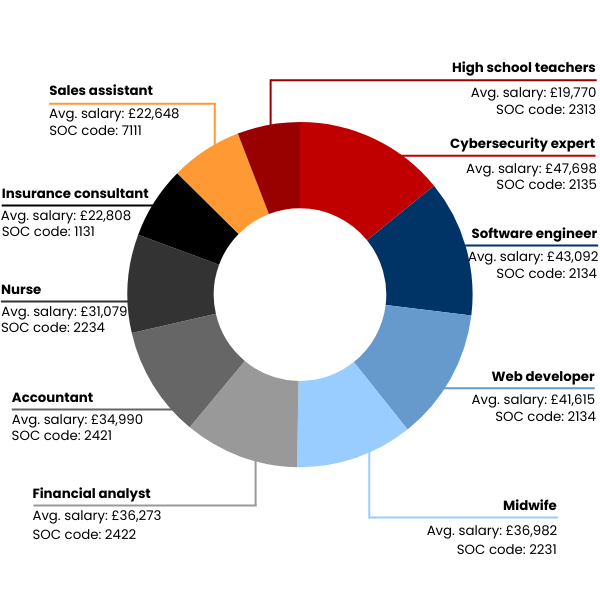
*The occupation code categorises every job in the UK labour market, which you'll need when applying for a working visa.
National Insurance (NI) in the UK is a social security contribution system in addition to income tax.

What is national insurance tax?
National Insurance (NI) tax in the UK is a social security contribution system in addition to income tax. Payments are automatically deducted from employees' earnings, with rates varying based on income:
| Weekly earnings | NI contribution (2025/26) |
| £0 to £242 | 0% |
| £242.01 to £967 | 8% |
| £967+ | 2% |
Both employees and employers contribute, including self-employed workers. NI is compulsory until you hit the state retirement age, which is currently 66 for both men and women.
What does national insurance pay for?
National Insurance pays for the National Health Service (NHS) and the state pension. It also helps pay for maternity allowance, bereavement support and some unemployment benefits, ensuring a safety net in times of need.
How much annual leave do you get in the UK?
UK employees are entitled to at least twenty-eight days of paid annual leave, including bank holidays. However, many employers offer additional holidays as part of their benefits package, often rising with time served, plus the option to take unpaid leave.
What is a bank holiday?
A bank holiday in the UK is a public day of rest during which banks and many businesses are closed. The government sets these holidays, which typically include New Year's Day, Easter Monday, May Day, Christmas Day, and Boxing Day. There are slight differences between bank holidays in England and Wales, Scotland, and Northern Ireland.

British history timeline
Pre-1600s
Humans have inhabited the island of Britain for millennia. Indigenous people, the Celts, and invaders like the Romans have shaped its culture, language and social structure.
1600s
Britain's colonial ambitions led to exploration across North America, with explorer John Cabot laying the groundwork for future colonies like Jamestown.
1700s
Following the Seven Years' War and the Treaty of Paris in 1763, Britain consolidated its status as a global power. The Acts of Union in 1706 and 1707 united England (including Wales) and Scotland, forming the Kingdom of Great Britain.
1800s
Thanks to advanced weaponry, the British Empire peaked during the Industrial Revolution. The Act of Union with Ireland in 1800 created the United Kingdom of Great Britain and Ireland.
1900s
The Irish Free State was established in 1922, forming the United Kingdom of Great Britain and Northern Ireland. In 1931, the Statute of Westminster granted legislative independence to the UK's dominions.

British culture: values, traditions, food and more!
Depending on where you're from, life in the UK might take a little getting used to, as the Brits have peculiar customs and quirks! If you're from English-speaking countries like the US and Australia, there will be similarities but also significant differences:
- Ingrained politeness: Britons are famous for overusing phrases like "please," "thank you," and "sorry," and would rather discuss the weather than anything that might offend a stranger!
- Historical heritage: the UK draws millions of visitors yearly thanks to landmarks such as Edinburgh Castle, Stonehenge and the Tower of London. Britain's past profoundly influences everything from architecture to national holidays like Remembrance Day.
- Will my plugs fit?: the UK uses type G plugs and electrical outlets featuring three rectangular prongs in a triangle pattern. The standard voltage is 230V, and the frequency is 50Hz. Visitors can use plug adapters for non-UK devices and equipment upon arrival; however, long-term use is considered unsafe.
- Sporting pride: the Brits have a passion for sports, particularly football (soccer), rugby, cricket and tennis, which were all invented in England. Exciting events, such as the FA Cup, Wimbledon, and the Six Nations, are major talking points throughout the year and unite the nation.
- Seasonal cheer: as a country with four distinct seasons, the UK enthusiastically embraces them all. Notable celebrations include Bonfire Night on 5th November, where communities burn effigies of failed royal assassin Guy Fawkes, and colourful markets, carol singing and family get-togethers during Christmastime.
- Multiculturalism: the UK is known for its diverse society, especially in large cities like London and Birmingham, where people from various backgrounds contribute to the country's cultural landscape. Celebrating different traditions and cultures, such as London's Notting Hill Carnival, is fundamental to modern British identity.
10 surprising facts about the UK
- The UK has some strange laws! To curb illegal salmon fishing, the Salmon Act of 1986 made it illegal to "handle salmon in suspicious circumstances".
- Bizarre place names are a staple of British life. However, the UK is also home to some very long and short names. "A" is a village in Shetland, while "Llanfairpwllgwyngyllgogerychwyrndrobwllllantysiliogogogoch" is a hard-to-pronounce Welsh town!
- The world's first traffic light system was installed outside the House of Parliament in London in 1868. It was manually operated and featured railway signalling gas lamps representing "stop" and "go".
- For more than twenty years, Bristol-based graffiti artist Banksy's identity has remained unknown despite numerous attempts by the media to unmask him. His celebrated anti-establishment and often humorous artworks appear randomly across the UK and worldwide.
- The world's longest pleasure pier is in Southend-on-Sea, Essex, measuring over 1.3 miles long. If you don't fancy the walk, a train can take you to the end and back.
- From the 1200s to the 1900s, the Tower of London housed exotic animals, including lions, polar bears and elephants. The animals were gifts to the reigning monarchs and were publicly displayed during the 1800s.
- Beneath the streets of Liverpool lie the Williamson Tunnels, a network of secret 19th-century tunnels initially constructed to transport goods from the Liverpool docks. Today, they are a popular tourist attraction.
- In 1858, London experienced a severe heatwave that intensified the smells of the polluted River Thames. The resulting stench was so overpowering that it prompted the construction of the city's modern sewage system.
- Stonehenge, a circle of standing stones in Wiltshire, England, is one of the world's best-known prehistoric monuments. To this day, how and why it was constructed remains shrouded in mystery.
- Cooper's Hill Cheese-Rolling and Wake is an annual event in Gloucestershire, England. Participants race down a steep hill to chase a rolling wheel of cheese. Post-race hospital visits are not uncommon in this much-loved yet bizarre tradition!
The world's longest pleasure pier is in Southend-on-Sea, Essex, measuring over 1.3 miles long.

Does the UK have free healthcare?
The UK provides mostly free healthcare services for residents. The National Health Service (NHS) is funded via National Insurance payments, ensuring essential care, such as doctor visits and hospital stays, are available without charge at the point of service.

Which celebrities are moving to the UK?
Recently, numerous celebrities have made the UK their permanent home or have at least bought a summer retreat. The following are a few notable celebs who can't get enough of Dear Old Blighty:
George Clooney: the ER and Batman & Robin star bought a £12M Grade II listed mansion in Sonning, Berkshire, after marrying English lawyer Amal Alamuddin in 2014. "I do love it here," Clooney declared on ITV's Good Morning Britain soon after the purchase.
Tori Amos: the American singer-songwriter relocated from Los Angeles to sleepy Cornwall in 1997. Amos has kept a quiet profile in the countryside while raising a family and continuing to write and record music.
Tim Burton: the Edward Scissorhands director moved to North London after meeting his future wife, Helena Bonham Carter, in 2001. The couple have since split, but Burton remained after falling in love with the UK. "When I first came to England, I thought, 'Wow! I'm home!'" he told the Guardian in 2016.

Traditional British food: famous dishes in the UK
From beloved classics like fish 'n' chips and Sunday roasts to Chinese takeaways and Indian curries, British food has evolved to reflect the country's multiculturalism. Here are some of the UK's best-loved meals you must try:
- Fish 'n' chips: deep-fried battered fish and thick-cut chips, often with mushy peas, salt, vinegar and tartar sauce.
- Roast dinner: a traditional Sunday meal for the entire family consisting of roasted meat (usually beef, chicken, pork or lamb), roasted potatoes, Yorkshire pudding, vegetables, and gravy.
- Sweet and sour chicken: a Chinese-inspired dish featuring crispy battered chicken pieces in a tangy sweet and sour sauce, often served with rice.
- Haggis: Scotland's national dish is a savoury pudding made with sheep's organs, onions, oatmeal, suet, and spices. It's served with neeps (mashed turnips) and tatties (mashed potatoes).
- Full English breakfast: a breakfast of eggs, sausages, bacon, black pudding, baked beans, grilled tomatoes, mushrooms and toast.
- Chicken tikka masala: a globally popular British-Indian dish of roasted marinated chicken in a creamy tomato sauce, served with naan bread or rice.
- Welsh rarebit: a savoury favourite in Wales, made with a rich cheese sauce containing melted cheddar, beer, mustard and Worcestershire sauce poured over bread.

How to move to the UK in 2026
For over 25 years, Seven Seas Worldwide has shipped household belongings to hundreds of countries. From London to Edinburgh, we'll safely ship furniture, kitchen appliances, sporting equipment, boxes, bags and more to the UK. Our expert team, free packing supplies, customs knowledge, complimentary storage, and multilingual customer support set us apart from other international removal companies.
What is the MoveCube® moving pod?
You can ship all your home's possessions inside our secure shipping crate, the MoveCube®. It acts as your own dedicated container, brought to your door for you to fill with sofas, kitchen appliances, bikes, musical instruments, boxes, bags and more!
Each MoveCube® order includes a complimentary Starter Pack. Inside, you'll find measuring tape, a marker pen, a box cutter, a roll of parcel tape and a tape dispenser to help you pack. Plus, three plastic floor sheets to help you estimate the space inside a Large, Medium, or Small MoveCube®.
You can order as many MoveCubes® as needed, but please note that they may arrive on separate days. Start your exciting new life in the UK today with a quick, free quote and see a transparent cost breakdown of the entire overseas shipping process.
Another benefit of choosing our international removal service is that we guide your shipment through the British customs process. However, there are a few things to remember before packing your boxes and moving household items to the UK.
- Like all nations, the UK has restrictions on certain import items to protect its people and environment. Read our Prohibited Goods page before packing to avoid delays or fines.
- Complete all your online documents and ensure your inventory (a packing list of every item you're shipping to the UK) matches what's in the MoveCube(s)®.
- Upload clear, colour scans of your passport's picture and signature pages.
- If shipping wood, plant life or animal by-products and their derivatives, ensure they are not classified as endangered by CITES (Convention on International Trade in Endangered Species of Wild Fauna and Flora).
You must complete a Transfer of Residence (ToR1) form to import used personal goods into the UK duty-free. Qualifying criteria include:
- Making the UK your full-time residence.
- Having lived outside the UK for at least a year before importing.
- Owning and using your items for at least six months before importing.
- Keeping all items for personal use.
If you live and study in the UK, you do not need to complete a ToR1 form. You can import clothing, household effects (e.g., linen and bathroom items), and objects typically used by students, such as textbooks and calculators, with no duty charges.
Please reference our Importing into the UK page for a complete breakdown of the British customs process.

Transit times for shipping to the UK
The following are estimated transit times when shipping one Large MoveCube® by sea from the capital cities of some of our most popular routes to London, United Kingdom:
| Origin country | Transit time* |
| Australia | 130 days |
| China | 85 days |
| Hong Kong | 90 days |
| Ireland | 47 days |
| Malaysia | 110 days |
| Netherlands | 34 days |
| New Zealand | 142 days |
| Singapore | 110 days |
| South Africa | 90 days |
| Thailand | 100 days |
| USA | 170 days |
*as of 2026; dependent on global shipping circumstances.
What is the minimum wage in the UK?
The minimum wage in the UK for adults over 21 in 2026 is
£12.21 per hour
Source: gov.uk
FAQs about moving to the United Kingdom
To apply for a UK visa, research visitor visas and working visas on the official British government website to learn about eligibility and which documents you'll need.
Approval times for UK visas depend on personal circumstances. Factors include your origin country, the type of visa you're applying for, and whether you intend to work or study.
We advise checking the official UK government website for the latest processing estimates. Ensuring the accuracy of all information and documents during your application will reduce the likelihood of delays.
Your UK visa's validity period depends on its specifics. Before applying, carefully read the rules and stipulations of your desired visa.
Visit the official UK government website website to check which visas you qualify for.
The money needed to move to the UK depends on your residency route. Based on factors like visa application fees, the healthcare surcharge, flights and temporary housing costs, the teacher recruitment agency, Quantum Scholars, estimates £3,500 - £5,000 per person.
Choosing where to live in the UK depends on several factors, including lifestyle choices, schools and job opportunities. Lively cities like London and Manchester offer many jobs, restaurants and cultural options. Alternatively, the quiet, rural landscapes of the Highlands or the Lake District might better suit your vibe.
The UK's top 10 in-demand jobs are web developers, software engineers, cybersecurity specialists, high school teachers, insurance consultants, accountants, financial analysts, customer service representatives, nurses, and midwives.
The best universities in the UK are the University of Oxford, University of Cambridge, Imperial College London (ICL) and University College London (UCL).
Living in the UK offers diverse experiences, thanks to vibrant cities packed with cultural options and exciting nightlife, as well as the quiet, rolling hills of the countryside. Brits can enjoy free healthcare at the point of service, a competitive jobs market, multiculturalism and stunning landscapes.
You can move to the UK without a job if you are studying, have a unique business idea or if you qualify for a Family visa or Global Talent visa.
You can import cats, dogs and ferrets into England, Scotland, and Wales, provided they are microchipped, vaccinated against rabies and have an up-to-date pet passport or health certificate. Different rules apply to Northern Ireland.











